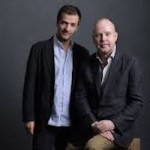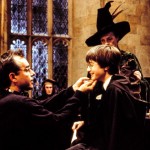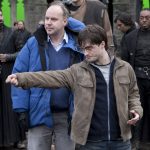Leaky’s ‘Fantastic Beasts’ Interviews #1: David Yates and David Heyman

Nov 16, 2016
Directors, Fantastic Beasts, Fantastic Beasts Movie, Filmmaker Interviews, Harry Potter and the Cursed Child, Heyman, Heyman Interviews, Interviews, J.K. Rowling, News, Redmayne, Yates, Yates Interviews
It’s been quite a week for the Fantastic Beasts cast, first the black carpet worldwide premiere in New York last Thursday, and yesterday the blue carpet European premiere took place in Leicester Square, London.
The Leaky Cauldron were lucky enough to attend both premieres, which were live streamed on our Facebook page, but Warner Bros also gave Leaky the wonderful opportunity to interview the cast of Fantastic Beasts not once, but twice!
David Heyman breezes into the room wearing a determined face, flinging the door open effortlessly with David Yates following. We all greet each other softly; it’s the first interview of the morning. I had just seen Fantastic Beasts in a private screening at the Warner Bros offices, and I was buzzing to ask David and David about their input on the film.
Just as the two sat down, the first question was off like a rocket, setting off our journey into the filmmakers’ minds.
QUESTION: How did you react when J.K. Rowling said she was willing to write this screenplay?
“With enthusiasm” was David Heyman’s response, “You know, when Potter ended, it was with mixed emotions. There was sadness, because a family was going its separate ways, but at the same time great excitement to have the opportunity to embrace new challenges. But after a few years away…”
At this we all laughed tentatively, we never knew we were going to get these stories back, but at the same time how could a world that has the potential for so much exploration in geography and history be forgotten so easily?
Heyman continued:
“You know, Potter has been such a huge part of both of our lives. It’s changed my life in so many ways, and only for the better. I am eternally grateful for what Jo has given me, given us, so yeah, really happy to come back to a world which offers so many possibilities as an artist, as a producer. To work with people like David, who’s a friend and a partner in crime, people like Stuart [Craig] and Colleen Atwood and Philippe Rousselot, and just allowing your imagination to run wild – what a privilege to play in that sandpit!”
QUESTION: Were you surprised that she [J.K. Rowling] was able to write a screenplay, out of a kind of encyclopaedia?
David Heyman: “Jo admitted that it was her first screenplay, but she’s a really fast learner, and her imagination is so vivid. She’s super bright, so she got the form relatively quickly.
“The screenplay developed over about a year or so, and during that process she was just a very quick learner. When the script arrived on my desk the first time I was a little bit nervous, just because when you’re a great novelist does not necessarily mean you can write screenplays. It’s a very different medium and Lord knows there are several people who have tried who haven’t succeeded. But when you read it, when you opened it up, immediately you knew you were in the hands of someone who was a great writer, and could create vivid – I mean – the characters were undeniable, and some of the scenes were undeniable.
“It was how they related, and I think also working with David and with Steve Kloves. One of the incredible things about Jo’s humility is that she doesn’t come in saying “I know“, she comes in knowing her world, knowing her characters, but understanding, as David said, that the form was new to her. It was a learning curve.”
QUESTION: How did you work with her [Jo] on the screenplay?
David Yates: “So, she would present a draft, we’d look at it and sit down and go through notes. We’d go through each sequence, discuss what was working, what wasn’t working, and as David [H] said, Jo is really pragmatic – she’s not at all precious. You imagine someone who’s created work that’s had such a sort of reach globally in terms of her stories and her books that she could be very proprietorial and territorial, but in this process she’s been quite open, and ambitious with the material, and keen for it to be tested. But in that process she’s always kind of ahead of you, in some shape or form, so if you give a note about a character she totally gets it, and she’s sometimes there before you anyway, and what Steve [Kloves] and I would do often is we would read the script with her, so we’d be in a room like this and we would sit around a table, and I would read twenty pages, then Jo would read twenty pages, and as you read the script it sort of floats into the room in front of you, and you can hear the story, you can feel it, and hear the characters speak. At that process you start to discuss what’s working, what’s not working.”
“The biggest challenge of the script ultimately was to find its tonal balance, because Jo is a very generous writer. There’s drama, there’s comedy, there’s deep, big themes that are complicated and interesting and resonant and political, so there’s a lot of stuff to manage and balance together, and ultimately it’s finding the melody that balances all those things together in a way that feels cohesive.”
“The melody?” we ask, knowing that this will be one of those times where the creators let us get a feel for the beauty of the filmmaking process.
“The melody.” David Yates repeats with a smile.
You can see why people who work with Yates are so complimentary of his style. He’s calming, reassuring and wonderfully enigmatic all at once. He has a way of turning everything he says into a story, and Heyman only adds to this. What we wouldn’t give to spend every day on set listening to this team at work!
“It was a process, for her I think, of discovering the story she felt most passionate about, and that grew out of two or three drafts, working over a period of time. And then she nailed it.”
David Heyman cuts in here: “Two things on that. One: Jo’s voracious.”
Ever the eloquent storyteller, Heyman’s deep, contemplative tone and choice of vocabulary would put a smile on anyone’s face. ‘Voracious’ seems to be the theme of Jo’s development of Fantastic Beasts. When Leaky asked about how to soothe people’s initial concerns about Fantastic Beasts at the New York Press Junket, the response was simple: this was a story she didn’t just want to tell, but needed to tell.
Heyman: “She is a writer. She talks about how she needs to write. It pours out of her. We’re working on the second script [I look over at David Yates with wide excited eyes at this point, he smiles knowingly, but I know he won’t say a word], she did a first draft just to do a short outline – a beat sheet”
Yates: “Sort of like a scaffolding, the architecture”
Heyman: “And two days later a hundred and two page half–treatment-half-script arrived on our desk [they laugh]. She just can’t help it, she just writes, it just pours out of her. So that’s one thing.
“The other is, you know, David [Y] told us about the melody, and how you have so many different tones wrapped up in one story and flit back and forth between tones, and I think one shouldn’t underestimate how challenging that is to direct. It is really, really, realy difficult. You talk very generously about Jo [he says to David Yates], but I think you as a Director, to balance it so that you can jump tonally across the various feelings and moods and emotions that the script presents in a way that is harmonious and doesn’t jar…”
Heyman’s praising of Daivd Yates is certainly deserved. Fantastic Beasts manages to hop across moments of love, fear, violence and comedy effortlessly, also as a result of the excellent soundtrack (which complements the tone of the movie perfectly at any given moment), the beautiful script, the detail of the various sets and costumes, and the depth of each character. The beasts really add something to the movie as well – like characters in their own right, they tie together this ‘melody’ in ways that exemplify the raw talent of the creators’ genius.
QUESTION: Congratulations on this movie, to both of you – it’s really a great job. I wanted to talk about Eddie [Redmayne], because he seems to be perfect for this job, and I can’t imagine the movie without him, but was it from the beginning that you saw him in this role? And was it easy to convince him? Because it is a huge commitment for an actor with an Oscar to spend a few years working on this series, if each year there’s going to be a new movie?
Yates: “He was right at the forefront very early on. There’s something beautifully, quintessentially British about Eddie, and he’s a really fine actor. He’s got a real humanity, and a real soul. I think any time you put a camera on Eddie Redmayne you feel that. You feel this real humanity, and that was crucial for us because Newt Scamander’s quite knotty, and awkward, and socially inept. It’s very British, in fact.”
At this point, everybody shared a laugh and looked at me. Yates and Heyman looked understandably confused, not realising that seven of eight interviewers at the table were from various European countries outside of the UK, meaning I was the only British interviewer in the room, left to verify this narrative of quintessential British awkwardness. David Yates apologises, I reassure him of my understanding (it’s why I love Newt’s character so much!), and Heyman turns to me with a grin: “Do you know what I mean?” he chuckles.
I most certainly do!
Yates continues: “To begin with, we didn’t actually have a script to share with Eddie. We had Jo’s draft which was lovely and lyrical and whimsical and still developing. We wanted to present it to Eddie just at the right time after we got it absolutely right, so for the first three months we wanted to just tell him the general idea of what we were doing with Jo and what Jo was creating. It was a slow, wooing process to keep him interested.
“Eventually we had the script and sent it to him, and I think the fact that he loved the books and was a big fan of the movies… He once even auditioned to be in Harry Potter.”
If you weren’t already aware of this, ready yourself: Eddie once auditioned for the role of young Tom Riddle in Harry Potter and the Chamber of Secrets. Our interview with Eddie Redmayne (coming soon) goes more into this audition, and Eddie explains his connection to the actor who eventually got the role, Christian Coulson.
Yates: “He didn’t quite get through the rigorous process. It was a bit like the X-Factor auditions for Potter if you were a smaller actor coming through [we all laugh], and he was very young when he did it.
“The script that Jo created was beautiful, when you read it. It was beguiling and very different to Potter, actually, but had all its best qualities, so he jumped straight in.”
QUESTION: Did Jo write it with him in mind?
Yates: “No, but she was aware that he was kind of in the frame before we sent him the script.”
Heyman: “Jo didn’t write it with Eddie in mind, but when we went through the casting process and when we narrowed it down to who David [Y] felt was best, we then ran it by Jo because we wanted to make sure she was happy with it, and she was very excited.”
QUESTION: I hope you don’t mind the question, but why does the world need another Harry Potter spinoff?
Yates: “Well, you know, it’s funny when you say “Harry Potter spinoff” that sounds like it trivialises what I think we’re trying to do. It’s a new chapter in this world that Jo has created and within it are some fairly ambitious ideas I think, both in terms of the new characters and the themes going forward. You’ve got one of the greatest storytellers of our time, who has reached people around the world with her characters and she’s burning to bring to the world this set of new stories that aren’t Harry Potter, that aren’t Hogwarts, that aren’t set at a boarding school, that are set in the 1920’s, 1930’s, 1940’s – a parallel, an echo of our own time going forwards, with a whole new set of characters. Saying a “Harry Potter spinoff”, I think it misses the point.”
Heyman: “I’d also say that Jo Rowling didn’t need to do this. Jo Rowling has all the money she wants. Why she did it is because she needed to do it for different reasons. She’s a storyteller and this is a world she loves and knows, and as David said, it’s a different one to 1926 New York, and yes there’s connecting tissue to the Potter world but it stands on its own, and the themes – the environmental themes feel particularly relevant, and resonant. Especially in a time where the American president doesn’t believe in global warming. It was written long before Trump became president, but the themes about that are on the political spectrum. It’s the themes on the outside – the themes about tolerance and intolerance, the way people are stigmatised – those are you know the echoes of 1920s Germany or 1920’s Europe. The rise of Fascism feels particularly resonant today in a Brexit / Trump world. The film is an entertainment, but I think the reason why Jo’s words work is because she’s interested in the world, she’s interested in society, and I think this film is about that. These issues are timeless, they do resonate today.”
QUESTION: I’m wondering about the potential of the political and historical moments – as you said, it’s a very peculiar moment, so because there will be other films, how much will the story be involved with the great history of humanity? It’s full of very [David Yates cuts in here, offering the word ‘potent’, and the offer is taken] potent events?
Heyman: “Voldemort and the Death Eaters and the Malfoys echo those sentiments. I think the fact that it’s set between the wars most certainly is significant. Whether we deal with World War II or particular figures, I don’t know, but you can tell thematically already that’s a part of the story. But again, it’s an entertainment. I think that’ really important, that it is an entertainment, but as the best entertainments hope for, it does connect to our world, and I think that’s one of the things that makes it special.”
QUESTION: How can you decide at this stage that there will be five films? Do you have an outline?
Heyman: “Well, let’s hope this one does well [laughs]. She’s [Jo] though of it as five. She has the idea in her head of five-”
INTERVIEWER: And you know about what she’s ready to tell in the other films?
Yates: “Jo’s roughed out what’s going to happen, but really it’s all still bubbling away in her head, so it’s way too early to share. All I know is that when she was writing the first screenplay she wasn’t sure if she wanted to write anymore. She was going to write the stories for a trilogy. It was always planned as a trilogy. Then halfway through the first screenplay she was thinking ‘I’ll just mark out the stories for scripts two and three and someone else can write them’, because doing screenplays, you know…”
Heyman: “It’s hard!”
Yates: “It is hard, and she got to the end of the first screenplay, I think she felt really enthused by the whole process, and excited about it. She said “I’m gonna write all three. Nobody else is doing this, nobody else will write all three”, and halfway through this script we’re working on currently, she turned up to a meeting [looks at Heyman, they both grin] and she said [serious] “You know what, guys? This is five” [everyone laughs]”
QUESTION (LEAKY): You must’ve been like ‘Okay, wow’. How did you react?
Yates: “Exactly! Who knows, by the end of the third screenplay maybe it’ll be… [He trails off] But as David said, we’re just taking it one movie at a time. It’s a two year commitment to make, these movies are a huge undertaking, they’re very ambitious. From what she has said about the arc of five films, it’s very ambitious from a storytelling point of view, and very unusual for a popular blockbuster franchise – it’s interesting.”
There was also a question involving the future of Cursed Child. The cast were present at the blue carpet premiere in Leicester Square last night – we even got a wave from Paul Thornley (Ron)!
QUESTION: Besides this, there’s also a very successful play running in London at the moment – is it feasible that you [to David Heyman] as the Producer will turn that into a film?
Heyman: “You know, I have no idea. We haven’t discussed that at all. There’s not been a word about talking about that. At the moment the play is there, it’s doing incredibly well. We’re concerned with making the next film the best Beasts we can, so let’s see what happens.”
Obviously we all want to know about the future of Fantastic Beasts too. Yates and Heyman tell us more about how they’re planning on managing their outside projects around the series:
QUESTION: “I mentioned actors commitment to the film, but you are also committed to this series, and you as a director – how do you feel about it?”
Yates: “I am definitely committed to the second movie, and I want to stay involved with all of the movies. I love working with Jo and David [H] and Steve Kloves and Lionel Wigram. I am trying to conceive of a plan with this man [Heyman] to – on the back of each Beasts – try and squeeze in another little project. That would be my ideal – just a much smaller budgeted film I can shoot in a few weeks.”
QUESTION: The next one’s located in Paris?
Heyman: “We shot 1926 in London. 1926 New York. We both would love to shoot 1928 in Paris, but we’ll see.”
QUESTION (LEAKY): Are you enjoying exploring other countries in the films?
Heyman: “Yes, definitely, but the issue is partly budgetary, partly practical. Whether we both end up going to Paris, which we both really want to do [laughs], or whether we’re stuck-“
Yates: “Not stuck!”
Heyman: “Okay not stuck, whether we remain in glorious Leavesden in Watford!”
Yates: “We’ll probably do a bit of both, but we have to figure out how it’ll work.”
Heyman: “Yeah, I know, we do.”
With that, the Producer who’s been with us from the very beginning, and the Director who got us through the last four Potters and this whirlwind of a journey with Fantastic Beasts were called away to another interview. We said our thank you’s, and they were off!
Look out for our interview with Dan Fogler and Alison Sudol next up!
Thank you to Warner Bros for these fantastic opportunities, we’ve loved getting to know more about the film, and can’t wait for everybody to see it!





